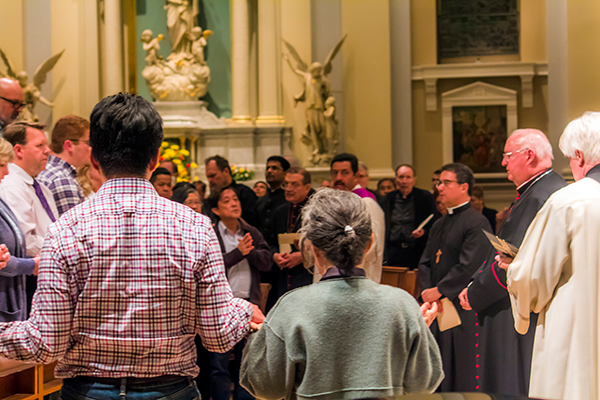
The Evangelization Framework is primarily overseen by the Faith Formation Commission, the Liturgical Commission and the Social Justice Commission. The Commissions meet ordinarily on the third Thursday of the month except July, August and December. The Vicar for Evangelization convenes all three commissions three times a year as the Evangelization Council on the third Thursday of March, June and November. The Council ensures that all nine goals of the Evangelization Framework are being addressed.
The Faith Formation Commission oversees developing deep and personal relationships with Jesus Christ through formation opportunities in all offices in and associated with the department. The three goals of this Commission are: 1. Ensure high quality and quantity faith formation programs; 2. Ensure high quality and quantity of faith formation leaders and, 3. Strengthen personal prayer life of Catholics in the diocese.
Guiding Principles:
- Goal 1: Focus on adults, incorporate families in the process, know the learners and use parish life as a curriculum for faith formation.
- Goal 2: Leadership must be professionally trained, Leadership must know the cultures of the people in the parish and, Leadership gives priority to the formation of catechists
- Goal 3: Find out where adults, youth and children are, start small and build on it; Teach and provide opportunities for people to experience a variety of forms and expressions of prayer; Teach best practices for prayer; and, Engage learner and families with tools and resources for prayer.
The Liturgical Commission ensures that the Liturgy is the source and summit of Catholic lives and call to missionary discipleship. The Commission has two standing committees: Art and Environment, and Catechumenate. In addition to overseeing diocesan liturgical formation and guidelines, the Commission has three goals: 1. Ensuring more inspiriting homilies among clergy; 2. Ensuring higher quality and more engaging liturgical music; and 3. Engage parishioners more actively in liturgy.
Guiding Principles:
- Goal 1: The homilist is called to interpret the lives of the people, including his own, through the lens of the Scripture and teaching of the Church so that they may be led to action and mission. (Cf. Preaching the Mystery of Faith, Chapters 1 and 2; Fulfilled in Your Hearing, #52)
- Goal 2: The primary music ministers of the liturgy are in the assembly, and the primary song of the liturgy is the music they sing. (Cf. Sing to the Lord, #28, Liturgical Music Today, #63)
- Goal 3: People participate when they feel they belong. (Cf. CSL, #7, #26; Constitution on the Church, #13; Rite of Christian Initiation of Adults, #9)
The Life, Justice and Peace Commission inspires and enables all in the diocese to know and practice Catholic Social Teaching and serve as witnesses in the community in responding to those in need. The three goals are: 1. Develop high quality and increase encounter opportunities to serve those in need in Santa Clara County; 2. Increase parishioner participation in service; and, 3: Increase financial stewardship in support of missionary service.
Guiding Principles:
- Goal 1. Build bridges between faith and action; 2. Increase preparation, reflection and celebration of encounter opportunities; 3. Reach out to those who are present in our congregations and those who are not in providing these encounter opportunities.
- Goal 2. Increase integration between faith and action; 2. Develop partnerships through communication, cooperation and collaboration; and, 3. Reach out to those who are present in our congregations and those who are not in with increased parishioner participation.
- Goal 3. Focus on the Common Good through our common responsibility to God, Church and the World; 2. Solidarity and accompaniment is key to increasing financial stewardship; and, 3. forming partnerships for those in the Church and outside the Church increases investment opportunities for increased service to those in need.
